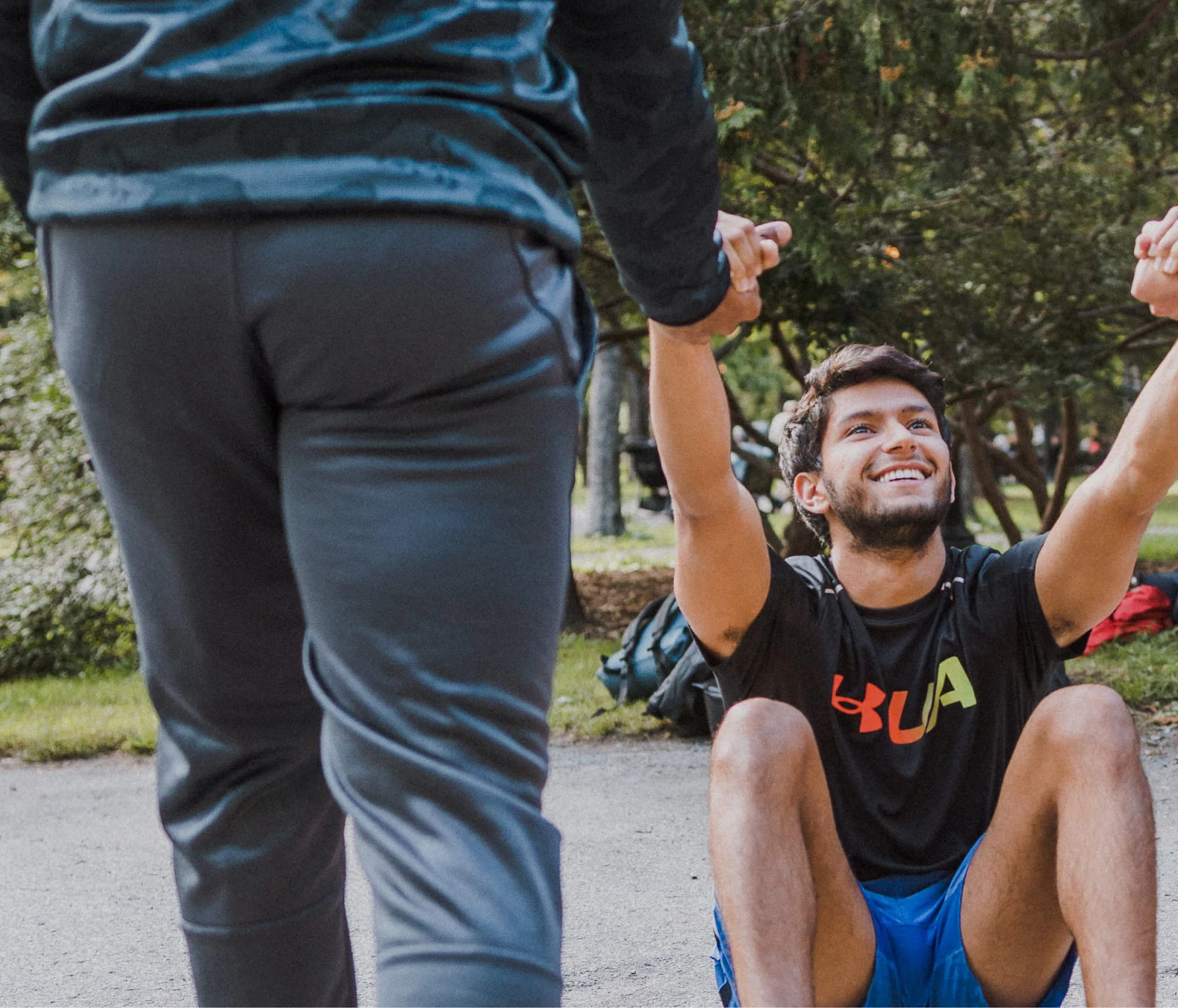1-year marathon preparation: the right duration for beginners?

10 min read
Summary
1-year marathon preparation: how to prepare for a marathon from scratch?
📈 Focus on gradual progress during the general development phase
💡 Number of workouts per week > Volume of training > Intensity
🏃🏽♀️ The central role of long runs in your training plan
⚡ Interval training to develop your engine and improve your speed
⏱️ A focus on marathon pace during the specific phase
🔎 Beginner or not, the advantage of a personalized 1-year marathon preparation
What is a reasonable race time for a first marathon?
🆒 Set a cautious time goal for your first marathon
🧐 Managing marathon effort and progress come with experience

Receive advice from our passionate coaches!
The marathon Campus plans cater to all types of runners. The shortest of 12 or 16 weeks are mostly for athletes who are already experienced and in good physical condition. Programs spanning 20 to 24 weeks offer greater flexibility and additional time to develop your runner's toolkit. They are also tailored to your profile if you are discovering the distance. Finally, for pure beginners or simply those who want to take their time and progress sustainably, a 1-year marathon preparation is recommended. This period may seem long on paper, but you'll understand through this article how crucial it is to take your time when you start.

Préparation marathon - 1 an
1-year marathon preparation: how to prepare for a marathon from scratch?
Preparing a marathon is not something that can be improvised. Before being able to line up for the mythical distance of 42.195 kilometers, it is crucial to follow a logical path and validate certain intermediate steps. (Gradual progression is the key to longevity)
📈 Focus on gradual progress during the general development phase
A structured training plan always begins with a general development phase. This applies to any distance. This phase is essential as it lays the foundation for all your preparation. The stronger the foundations, the more you can develop your running potential.
As a beginner, general development occupies most of your training program. It's logical because everything needs to be built. Your musculo-tendinous structure must get used to the shocks generated by running. For this, great emphasis is placed on very gradual progress. If you've never run, or haven't run for several years, it's best to avoid running 30 minutes straight from your first outings. Initially, walking and running alternation is preferred to gently get your body used to it.
Depending on your starting physical condition, you might need one or even two months before being able to run 30 minutes at ease breathing-wise. The process is slow, but it is essential not to rush. Once this first milestone is reached, you can set a new intermediate goal, and so on, until your body can handle long runs of two hours or more.
There is an absolute priority during your preparation: not to injure yourself. With this in mind, the best advice we can give you, in addition to gradual progress in your workouts, is to include strength & conditioning into your weekly plan. Just one or two sessions of about fifteen minutes can make a difference. The stronger your muscles are, the more robust your body is, the less likely you are to injure yourself.
💡 Number of workouts per week > Volume of training > Intensity
To improve in any activity, one must practice it regularly. Running is no exception to this rule. Training frequency is the first factor of progress in running. To prepare to run a marathon under good conditions, one must schedule at least three sessions per week and, if possible, four sessions. Once this routine is well established, you can activate a second lever, volume, by running at ease. In a third phase, once your body is ready to assimilate a good weekly volume, we will gradually introduce intensity by seeking higher speeds and heart rates. Respecting this order is the best way to progress… without getting injured.
🏃🏽♀️ The central role of long runs in your training plan
From novice to elite runners, no one escapes them during marathon preparation. These are of course the long runs. These workouts are absolutely necessary as they test your physical as well as your mental strength. This is precisely what you'll face on marathon day. At the peak of your preparation, that is, in the two to three months before your marathon, your long runs will range from two to two and a half hours of effort. For a beginner or returning runner, this may seem like an impossible mountain to climb. Rest assured, your body is an impressive machine. We can't imagine the performances we're capable of as long as we give ourselves the time. Don't forget that recovery is as essential as training. We are of course referring to sleep, nutrition, hydration, and managing your daily stress.

⚡ Interval training to develop your engine and improve your speed
Interval training involves alternating between fast running phases and recovery. One of the most well-known interval workouts is the 30/30. This type of training has multiple benefits, both biomechanical, neuromuscular, physiological, and psychological. Thanks to interval training, you will “unleash your body” by getting used to running at sustained speeds. You will develop your aerobic capacity. You'll also challenge yourself mentally during these intense efforts. Ultimately, you'll be more comfortable when running at your marathon pace.
⏱️ A focus on marathon pace during the specific phase
In preparation, we always move from less to more specific, regarding the targeted effort. That is why marathon pace work is only introduced in a second phase after having worked a wide spectrum of paces. This second phase is shorter for beginners than for runners aiming for performance. Indeed, an experienced runner will seek to optimize his pace, so that it gets as close as possible to his semi-marathon appearance. The logic is different for the beginner, whose major goal is to complete the race in the best possible conditions. Their marathon pace will be further from their half-marathon pace, sometimes close to their base endurance.
🔎 Beginner or not, the advantage of a personalized 1-year marathon preparation
If you're new to running, you have little or no training knowledge. That's perfectly normal. In this case, several solutions are available to you. You can choose to follow your instinct and train by guesswork. It's risky in a marathon. Then, you can choose to follow a generic training plan or hire the services of a personal trainer. The latter option is not affordable for everyone. Between the two, an excellent compromise is to follow a personalized marathon training plan. The 12-month marathon plans from Campus are perfectly suited for beginners. They take into account your running history, any injuries, your resources, and are adaptive based on your workout feedback. The icing on the cake, Campus now offers strength & conditioning options in all its plans.
What is a reasonable race time for a first marathon?
Numerous factors influence running performance. These include initial physical condition, age, sex, and other genetic factors. That's why two runners training the same way will rarely achieve the same times. Some are naturally better for short efforts. Others are more enduring and better suited for long distances like the marathon.
🆒 Set a cautious time goal for your first marathon
A firstmarathon is a leap into the unknown. It's impossible to know how your body will react during such a long effort until you've actually run the distance in training. The best way to approach your firstmarathon is to be “conservative” in your paces and aim for an “easily” attainable goal. Every runner will tell you, the marathon truly begins after 30 kilometers. It's about conserving as much energy as possible before this 30 km barrier. If you still have energy left, you can always accelerate at the end of the race - or at least maintain your pace - and overtake a lot of runners. The negative split strategy (a second half of the race faster than the first) is not easy to apply in a marathon but offers thrilling sensations.

Préparation marathon 1 année
🧐 Managing marathon effort and progress come with experience
A lot of parameters need to be mastered before truly optimizing marathon performance. Fatigue resistance, endurance, running economy, good nutrition management, mental strength, do not improve in the blink of an eye. It comes gradually, after several marathons. It's not uncommon for runners to continue improving their performance until later ages. That's what makes the marathon so beautiful.
You understand, a 1-year marathon preparation is highly recommended if you're starting out in running. Yes, it may seem long, but it's the necessary time to prepare your body for this event and minimize injury risk. Shorter marathon plans, 20 weeks, 16, or even 12 weeks are rather intended for more experienced runners. The 6 months plans are more suitable for beginners in good physical condition, who already have some basics in running.
Preparing for a firstmarathon over 12 months is the best way to reduce your stress level, physically and mentally, and to enjoy your preparation. The goal is not simply to successfully run 42.195 km on race day. It's also about enjoying the entire preparation process. And make you want to run many marathons!









